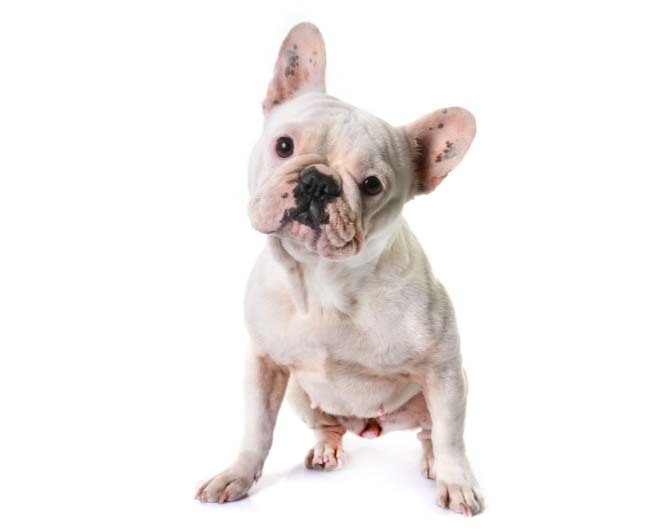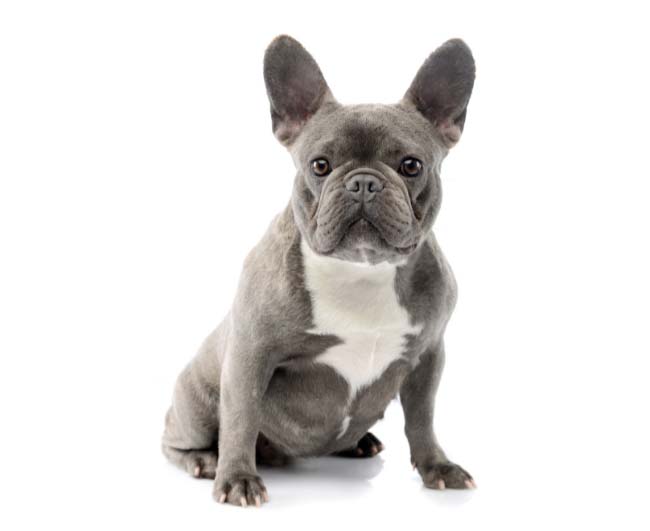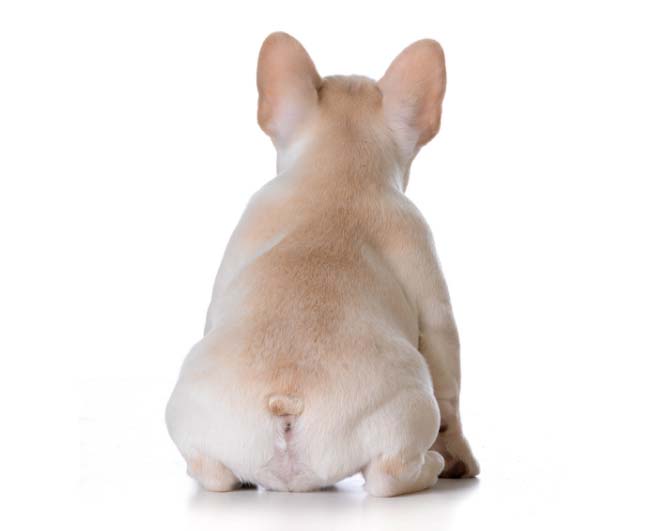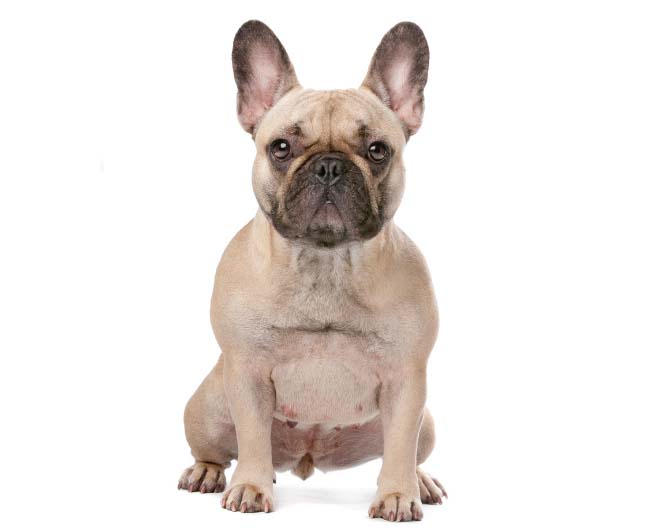We've gone Pink to help fight Breast Cancer.
Use code "BREAST" and we'll Donate $50 to National Breast Cancer Foundation
Main Menu
Petsy Breed Pages
The world’s most comprehensive information on the ...

$3500.00 - $5000.00
Bouledogue francais
Small
Non-Sporting Group
Medium
Extra low
Medium
10 to 12 years

Would you like to know what it would cost to insure an French Bulldog? Find out by getting a free quote, with petsy pet insurance.
















French Bulldog come in a variety of colours, including White, Blue and White, Tan, Red, Cream, Brindle, Black, Fawn with Black Mask, Brindle and White, Black and White.


How much do
French Bulldog eat?
2.50 to 3.00 cups of food a day

How much
exercise do they need?
60 to 90 Mins

Are they kid friendly? Yes, the French Bulldog breed is good with kids

Do they need a lot of space? French Bulldogs do not need a lot of room and do very well in apartments or small dwellings
Patellar Luxation
Legg-Perthes Disease
Hip Dysplasia
Heart murmurs
They need at least 1 to 1.5 cups of high-quality dry food a day, divided into two meals. Good nutrition is just as crucial for a young puppy as it is for a more grown Frenchie. Clean, fresh water should be made available at all times.
French Bulldogs don't shed much, but twice a year, they lose their undercoat. The Frenchie's tiny coat sheds minimally. Getting them a weekly brushing with a medium-bristle brush, a rubber grooming mitt or tool, or a de-shedding glove will help remove dead hair and have him seeing his best.
Brushing promotes new hair growth and gives skin oils, ultimately the coat, to help keep it healthy. Frenchie's facial plaits should be maintained clean and dry. The Frenchie's nails should also be trimmed regularly, as overly long nails can cause the dog pain.
French Bulldogs are relatively simple to groom and need only occasional brushing to keep their coat healthy. French Bulldogs do not usually wear their nails down and will need their nails trimmed frequently. Bathe your French Bulldog monthly or as required, and use a high-quality dog shampoo to maintain the essential oils in his skin and coat. It's good to begin grooming your Frenchie at a growing age and train your puppy to stand on a desk or floor to make this life easier for both of you.
A 15-minute walk per day should prevent them from becoming overweight. French Bulldogs do not require many exercises, but they do need daily walks to keep them at a healthy weight?Frenchies like participating in canine sports such as obedience, agility, and assembly.
However, as a flat-faced breed, they are prone to breathing problems and should never exert themselves in hot or humid weather.
Dental and health check-up are not entirely necessary for only humans, but for Frenchies as well. This is borne out of the increasing concern that Frenchies are more prone to health problems, and it is in their greatest interest to get medical care to stay well and fit. Discuss with your vet should any symptoms be present:
* Shortness of breath * Reduced exercise tolerance * Difficulty breathing * Coughing * Noticeable weight gain or loss * Swollen abdomen * Fainting * Loss of appetite * Depression * Nasal discharge
French Bulldogs are fit for families with or without children; they can also go along with cats and other pets if well acquainted. French Bulldogs unusually bark and, while they require some training, they don?t need much, giving them popular among city dwellers.
French Bulldog is also an energetic and loyal companion. A small-sized, playful dog with a good character for playing nice with kids.
French Bulldogs can be comfortable to train, but they can also be unreasonable. Be strong and patient when teaching this breed. A fun-loving radical, the French Bulldog, takes well to training when it's done positively with loads of food rewards, praise, and play.
French Bulldogs are responsible. However, their capacity to learn is masked somewhat by stubbornness. Despite this stubbornness, Frenchies can learn the things that are important to them quickly.
They also have prominent characters and can require a fair amount of training to make them civilized companions. They can be headstrong, but at heart, they're people pleasers and hence easy to train. The proper motivation (such as food) and making a game of the method will ensure their participation.
When they are socialized to them through puppyhood, Frenchies can get along great with other dogs and cats. However, overly spoiled Frenchies may be jealous of other dogs, mainly if those other dogs receive recognition from the Frenchie's person.
If asked together with a cat or dog, they may accompany, but some Frenchies will track cats and other small pets. French Bulldogs who haven't done socialized with other pets may show aggressiveness towards dogs of equal sex.
A Frenchie can show jealousy and competition in a multi-dog household. Early socialization and puppy training classes are supported. Showing the puppy to a wide variety of people, places, and situations will help him develop into a well-adjusted adult. Puppy coaching classes serve as part of the socialization method, encourage good behaviour, and help the owner recognize and correct bad habits.
Here are some of the breeders who we work with as part of our breeder awareness program.
They are invested in ensuring the longevity of the breed and that new owner become responsible Affenpinchers owners.
Affenpinchers who are friends of Petsy





Enter your email in the form below and we will send you the full report as a pdf directly to your inbox.
Don’t worry, we hate spam too – read our privacy policy
Find the right level of insurance for your needs our customised quote takes less than a few minutes to complete.
They need at least 1 to 1.5 cups of high-quality dry food a day, divided into two meals. Good nutrition is just as crucial for a young puppy as it is for a more grown Frenchie. Clean, fresh water should be made available at all times.
A 15-minute walk per day should prevent them from becoming overweight. French Bulldogs do not require many exercises, but they do need daily walks to keep them at a healthy weight?Frenchies like participating in canine sports such as obedience, agility, and assembly.
However, as a flat-faced breed, they are prone to breathing problems and should never exert themselves in hot or humid weather.
French Bulldogs are fit for families with or without children; they can also go along with cats and other pets if well acquainted. French Bulldogs unusually bark and, while they require some training, they don?t need much, giving them popular among city dwellers.
French Bulldog is also an energetic and loyal companion. A small-sized, playful dog with a good character for playing nice with kids.
When they are socialized to them through puppyhood, Frenchies can get along great with other dogs and cats. However, overly spoiled Frenchies may be jealous of other dogs, mainly if those other dogs receive recognition from the Frenchie's person.
If asked together with a cat or dog, they may accompany, but some Frenchies will track cats and other small pets. French Bulldogs who haven't done socialized with other pets may show aggressiveness towards dogs of equal sex.
A Frenchie can show jealousy and competition in a multi-dog household. Early socialization and puppy training classes are supported. Showing the puppy to a wide variety of people, places, and situations will help him develop into a well-adjusted adult. Puppy coaching classes serve as part of the socialization method, encourage good behaviour, and help the owner recognize and correct bad habits.
Suite 58, Mezzanine/388 George St, Sydney NSW 2000
Petsy Pty Ltd (ABN 54 633 343 058, AR 1277359) (‘Petsy’) distributes and promotes Petsy Pet Protection Plus (formally Petsy Pet Insurance), Petsy Puppy Protection Plus and Petsy Kitten Protection Plus as an authorised representative of Knose Financial Services Pty Ltd (ABN 38 620 795 735, AFSL 536651) trading as ThePetInsuranceCompany.com.au (‘ThePetInsuranceCompany.com.au’). ThePetInsuranceCompany.com.au is an underwriting agency acting under a binding authority as an agent for the insurer; Pacific International Insurance Pty Limited (ABN 83 169 311 193) (‘Pacific) in relation to Petsy Puppy Protection Plus and Petsy Kitten Protection Plus policies and Petsy Pet Protection Plus policies from 01 March 2023 or have an anniversary renewal date from 18 March 2023, and the Australia branch of Allied World Assurance Company, Ltd (ABN 54 163 304 907) (‘Allied World’) in relation to Petsy Pet Insurance policies purchased between 17 February 2022 and 28 February 2023 (inclusive) or renewed between 01 March 2023 and 17 March 2023 (inclusive). In all aspects of arranging this product, Petsy and ThePetInsuranceCompany.com.au act as an agent of Pacific/Allied World (as the case may be) and not as your agent. Any advice contained in this email is general advice only and has been prepared without taking into account individual objectives, financial situation or needs and you should consider the appropriateness of any such advice, the Product Disclosure Statement (‘PDS’) and the Target Market Determination (‘TMD’) available via http://www.petsy.com.au or by calling 1300 952 790 before making a decision to acquire, or to continue to hold, the product. Terms, conditions, limits and exclusions apply. Please refer to the PDS.
© Copyright 2024 Petsy Pet Insurance
During the application process You will be provided with the option to include Optional Extra Benefits that cover certain conditions and Treatments which are not otherwise covered under the Policy.
The Optional Extra Benefits are:
Alternative Therapies, Behavioural Problems, and Dental Illness.
Examples of Alternative Therapies: Acupuncture, physiotherapy, hydrotherapy
Examples of Behavioural Problems: Excessive licking, fur pulling, pacing and destructive
chewing.
Examples of Dental Illnesses: Dental diseases, gingivitis, periodontal disease.